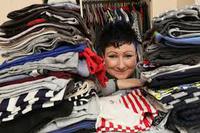Counselling » ADDICTION » SHOPPING
Addictions.com
Recognizing the Signs of Shopping Addiction
A concerned friend or family member may be able to quickly and easily spot the signs of a shopping addiction even before the addict himself can notice such signs.
Some of the signs of shopping addiction include:
- Overspending. If you find that you constantly overspend and take money from your budgeted expenses to cover a shopping excursion than you may be a victim of shopping addiction.
- Compulsive purchases. If you compulsive purchase items despite a need to buy something or if you notice that you buy ten pairs of shoes at a time instead of just one, there could be a problem.
- Chronic shopping. If you notice that you don’t just overspend once in a while or you don’t just over shop once in a while than you may have a chronic shopping addiction problem.
- Lying about the problem. Do your friends or family members constantly want to know where your money is going but you tell lies about it? If you lie about your shopping in an effort to cover up what is really going on there couldbe a problem.
- Shopping, guilt, shopping, guilt. According to Columbia University, shopping addicts usually feel guilt, anger, and/or sadness following the initial euphoria of shopping. If your shopping leads to guilt and yet you shop again, you could have a problem.
- Broken relationships from shopping. Does your spending or desire to shop lead to broken relationships? If your desire to shop has caused havoc on your relationships and despite your desire to do better you continue to shop, then there is a problem.
- Consequences don’t help. If you know that there will be consequences if you shop but you still decide to spend money than you are stuck with the consequences. The consequences may include relationship troubles, financial troubles, regret and guilt.
-
Additional Signs or Behaviors that Could be a Sign of Shopping Addiction
If you show any of these additional signs or behaviors, you could have a significant problem that warrants the need for intervention, counseling or treatment for a shopping addiction:
- Spending money when you are angry
- Spending money when you are depressed
- Spending money when you are anxious
- Spending money when you are depressed
- Arguing about spending habits
- Feeling lost if you are not spending
- Purchasing items on credit when you don’t have the cash to cover them
- Feeling a rush when shopping
- Feeling guilty or embarrassed about shopping after the fact
- Obsessing about money

